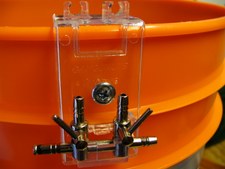
Anyone who has ever gardened will tell you there is a constant need to replenish the nutrients depleted by crops and there is also a need to protect the harvest from bugs bent on eating your yield. What is an appropriate response to these issues in a post peak petroleum world? Compost tea of course.
The green revolution of the 1950’s and 60’s included advancements in the mechanization of farm labor, further developments in irrigation techniques, genetic modification of plants through modern hybridization AND the introduction of chemical fertilizers and pesticides produced from fossil fuels. The combination of these efforts increased agricultural yields and eventually led to the domination of commercial farming in our grocery stores and across the landscape of
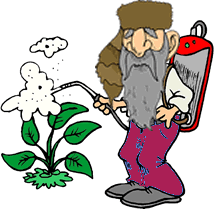
Commercial pesticides on the other hand are made from petroleum. Again we’ve seen a steady increase in the price of pesticides. This is due in part to the fact that the price of petroleum has continued to increase(remember U.S. oil production peaked in 1971) but also because of growing pesticide resistance and other manmade troubles. It turns out that the use of Genetically Modified crops actually increases the use of pesticides. Sometimes I’m not sure whether Agrobizcorp is coming or going.
There are other ways to make nutrients available to your plants and to protect them from ravenous pests. In addition to using compost as a way to recycle organic material back into the soil you can also infuse it in water to create a wonderful mixture your plants will love.
Using compost tea to water plants or as a foliar spray provides an overall increase in plant health and plant growth. This is achieved first by reducing the shock associated with transplanting. Compost tea also promotes improvement in soil structure by increasing the number of favorable microorganisms in the soil community. These same microbes increase the availability of nutrients in the soil providing more food for the plants. They also lead to an increase in the capacity of the plant to absorb the nutrients as well as an improvement in the ability of that same soil to hold moisture. Evidence, albeit anecdotal shows a reduced need for water in excess of 50% when compost tea is applied on a regular basis. In addition to helping ward off pests by strengthen the plants themselves, the microorganisms in compost tea also help fight natural plant enemies by occupying plant surfaces and competing for nutrients often utilized in unhealthy soils by these same pests. All of these benefits mean better yields and reduced costs, not to mention a reduction in your dependency on fossil fuels. And the best part is it’s so easy. There are commercial systems for brewing large quantities. There are also enterprising individuals already brewing to sell.
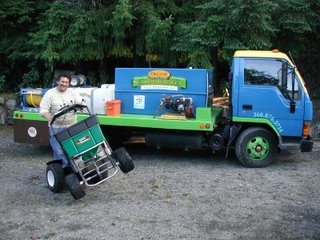 More power to them. For brewing your own though you’ll only need the following:
More power to them. For brewing your own though you’ll only need the following:
5 gallon bucket
Unsulfured molasses or honey
Non-city water
Several handfuls of mature compost
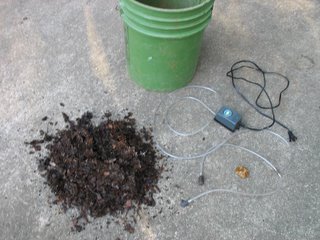
Let’s get started.
1. Fill your bucket with a mixture of compost and water. Use a ratio of 6 to 1; that is six parts water to one part compost.
2. Next place the bucket in an outdoor location where you have access to the electricity necessary to run the air pump. Position the pump so that you can attach the tube and the air stone and dangle them deep into the water.
3. Drop in your sugar source.
4. Let the contraption sit for three days and your compost tea will be ready. Use it immediately as it will go bad quickly.
5. If you’re going to spray it onto the foliage of your plants you will want to strain it using cheese cloth or women’s stockings so as not to clog up your sprayer.
That's it! Here are some helpful hints to aid in your effort. Compost is obviously the critical ingredient. Do you compost? This would be a good time to start a pile if you don’t. If you don’t have a compost pile search for an old pile of rotting leaves. Purchasing compost is another short term solution.
The oxygenation of the water provided by the pump creates an environment in which aerobic bacteria can live. You can see the air bubbles rising to the surface in the photo above. Remember that aerobic bacteria are the good guys that smell nice and benefit your soil. Your compost tea should smell earthy if not sweet. If it smells rotten something has gone wrong. The most likely culprit is not enough air or too much time. The anaerobic bacteria that can’t stand oxygen are smelly and can contain pathogens. Don't use smelly compost tea.
As with any natural process the method needs adjusting based on your location and situation. Experimentation is as always the best instructor. I occasionally use less compost or sometimes put in more sugar, always testing out change. I have made a bad batch or two but if you stick to the basic directions above you should be able to brew your own compost tea relatively quickly and for almost no money. For those of you who are interested in a fossil fuel free way in which to feed and strength your plants homebrewed compost tea is great.
For more information visit:
Soil Food Web
The Great State of Pennsylvania
The Great State of Texas
Growing Solutions
Ecocycle
Lawn Jockey
Communi-tea
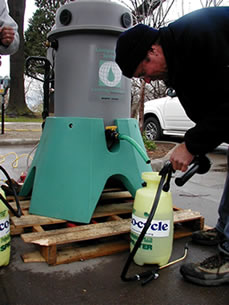

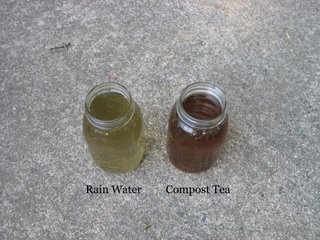


No comments:
Post a Comment